
-
Find the right food for your petTake this quiz to see which food may be the best for your furry friend.Find the right food for your petTake this quiz to see which food may be the best for your furry friend.Featured products
 Perfect Digestion Small & Mini Adult Dog Food
Perfect Digestion Small & Mini Adult Dog FoodHill's Science Plan Perfect Digestion Small & Mini Adult Dog Food with Turkey is a complete premium pet food for small breed adult dogs aged 1–6 years. This deliciously smooth mousse is precisely balanced to deliver the appropriate amount of energy and to support digestive health in adult, small breed dogs.
Shop Now Perfect Weight Small & Mini Adult Dog Food
Perfect Weight Small & Mini Adult Dog FoodHill's Science Plan Adult Small & Mini Dog Food with Turkey is a complete premium pet food for adult small dogs from 1 year old that are prone to weight gain or slightly overweight. This deliciously smooth mousse is formulated to deliver the appropriate amount of energy to support weight maintenance in adult dogs.
Shop Now Hypoallergenic Small & Mini Adult Dog Food
Hypoallergenic Small & Mini Adult Dog FoodHILL'S SCIENCE PLAN Hypoallergenic Small&Mini Adult dog food with Salmon is complete pet food for adult small dogs 1–6 years old. It's formulated for dogs with delicate skin and stomach, with limited high quality novel protein sources & no grain.
Shop NowFeatured products Urinary Health Adult Cat Food with Chicken
Urinary Health Adult Cat Food with ChickenHill's Science Plan Urinary Health Adult Cat Food with Chicken supports the health of the whole urinary system. Suitable for sterilised cats.
Shop Now Sterilised Mature Adult Cat Food
Sterilised Mature Adult Cat FoodHill's Science Plan Sterilised Cat Mature Adult Cat Food with Chicken is specially formulated with ActivBiome+ Multi-Benefit Technology. It is a precisely balanced nutrition tailored to meet the needs of mature adult sterilised cats, ages 7+, and to promote graceful ageing.
Shop Now Oral Care Adult Cat Food
Oral Care Adult Cat FoodHill's Science Plan Oral Care Adult Cat Food with Chicken contains clinically proven kibble technology to reduce plaque & tartar build up.
Shop Now -
Dog
- Dog Tips & Articles
-
Health Category
- Weight
- Food & Environmental Sensitivities
- Urinary
- Digestive
- Joint
- Kidney
-
Life Stage
- Puppy Nutrition
- Adult Nutrition
- Senior Nutrition
Cat- Cat Tips & Articles
-
Health Category
- Weight
- Skin & Food Sensitivities
- Urinary
- Digestive
- Kidney
-
Life Stage
- Kitten Nutrition
- Adult Nutrition
Featured articles Develop your gut instinct | Hill's Pet
Develop your gut instinct | Hill's PetDigestive disorders can affect any part of the digestive system, from the stomach, small intestine and through to the large intestine.
Read More Tips For Mixing Wet And Dry Pet Food
Tips For Mixing Wet And Dry Pet FoodDiscover tips for mixing wet and dry pet food to ensure balanced nutrition and variety for your pet. For comprehensive feeding advice, visit Hill's Pet UK.
Read More Virtual Vet Visits: What You Need to Know
Virtual Vet Visits: What You Need to KnowLearn the ins and outs of a televet appointment before you talk to a vet online.
Read More -


Lymphoma in cats is a cancer of the lymphatic system, which is the combination of lymphocytes (blood cells) and organs (lymph nodes, etc.). It can affect many systems in a cat's body, and is the most common cause of spinal cord tumours.
According to The Royal Veterinary College, feline lymphoma is the most commonly diagnosed cancer in cats. There are many types of lymphoma in cats, but the most common is intestinal lymphoma, also known as gastrointestinal (GI) or alimentary lymphoma. A variety of factors will determine how this cancer might affect your cat.
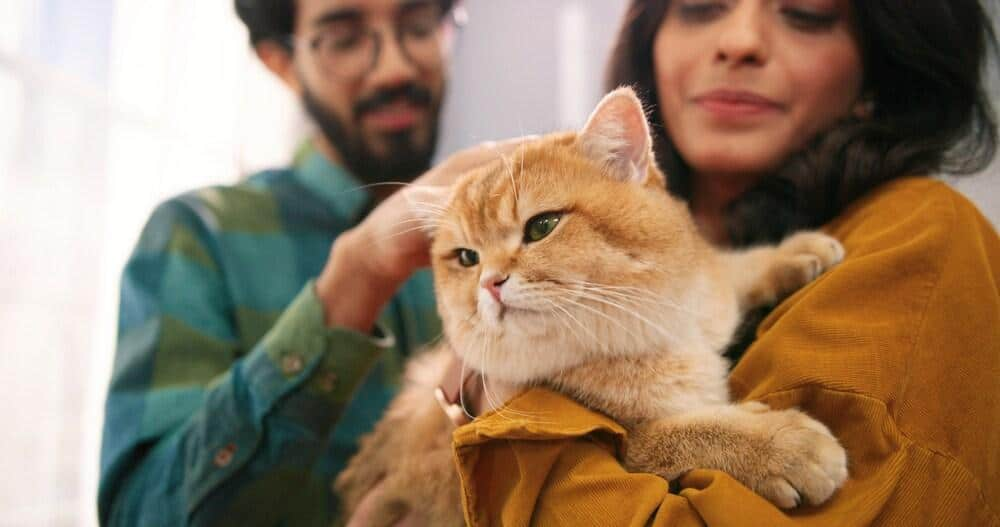
Causes of lymphoma in cats
The onset of feline lymphoma has been linked to the feline leukaemia virus (FeLV), and, to a lesser extent, feline immunodeficiency virus (FIV). Cats who are positive for feline leukaemia generally develop cancer at a younger age. These days, because there's widespread testing for and vaccination against FeLV, lymphoma is less common in younger cats. Cats who are negative for the virus tend to develop lymphoma at an older age.
The Blue Cross says that exposure to tobacco smoke may increase the risk of lymphoma in cats. They explain that, while secondhand smoke may be harmful to all pets, cats are especially vulnerable. Not only do they breathe in smoke from the air, but while self-grooming, they may also ingest toxic particles from smoke that has infiltrated their fur.
Types of lymphoma in cats
Because the lymphatic system interacts with every system in the body, lymphoma can affect any of these organs. The main types of lymphoma include:
- Alimentary (digestive tract)
- Mediastinal (chest)
- Renal (kidneys)
- Nasal (nose)
- Spinal (spine)
- Cutaneous (skin)
- Multicentric (meaning multiple organs are affected, most often the spleen and liver)
Signs of lymphoma in cats
Signs of lymphoma in cats depend on which organs are affected. Here are some of the signs to look out for according to where the lymphoma is located:
- Digestive tract: Vomiting, diarrhoea, constipation, loss of appetite, weight loss, lethargy and bloody stool.
- Chest: Open-mouth breathing, coughing, loss of appetite, weight loss and regurgitation.
- Kidneys: Increased drinking and urinating, weight loss and loss of appetite.
- Nose: Chronic nasal discharge, bloody nose, swollen nose, sneezing, loss of appetite, eye discharge and noisy breathing.
- Spine: Weakness or paralysis of the back legs.
- Skin: Itching, hair loss and bleeding skin tumours.
If you notice any of these signs in your cat, immediately contact your veterinarian. They can diagnose your cat's condition and determine the best treatment.
Diagnosis of cat lymphoma
Lymphoma is diagnosed using a combination of information. If your vet suspects your cat has lymphoma, they'll ask you about your cat's history and lifestyle. They'll likely follow up with a physical examination of your cat, laboratory testing (including blood tests, urinalysis, and testing for FeLV and FIV) and imaging studies, such as radiographs and ultrasounds.
The testing that your vet recommends will vary depending on the type of lymphoma they suspect. If there's a mass or swollen lymph node, for example, they may also take a biopsy. This involves taking a small sample of the affected tissue and examining it for cancerous cells.


Tasty Tips
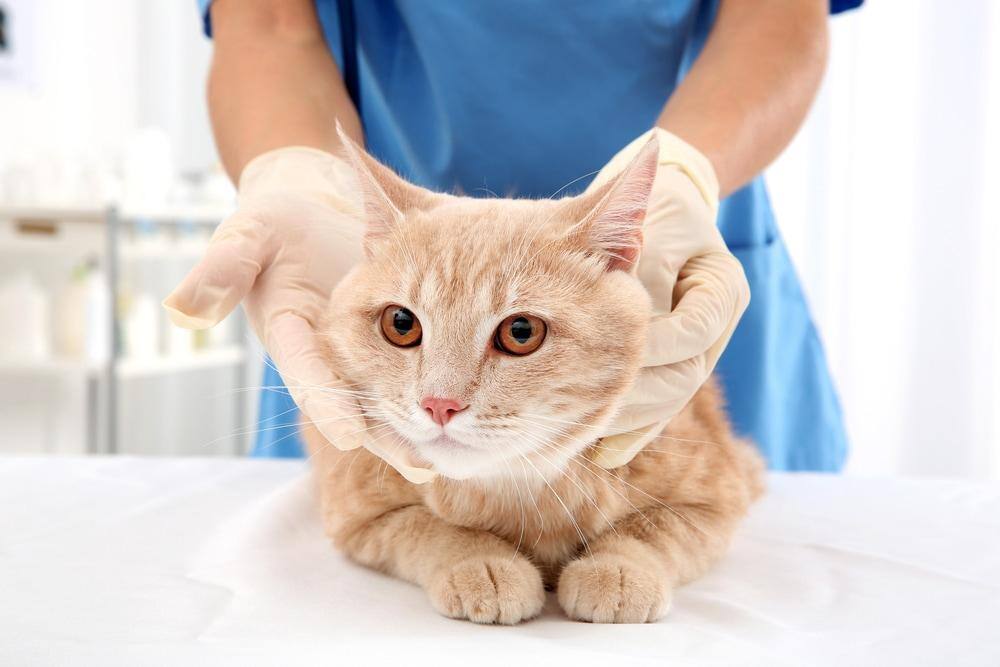
Treatment of cat lymphoma
Feline lymphoma treatment is aimed at putting the cancer into remission (eliminating all signs and symptoms) and maximising your cat’s quality of life for as long as possible. Because lymphoma is usually widespread in the body, explains Blue Cross, chemotherapy tends to be the preferred option rather than surgery. Cats tend to respond well to this treatment and don’t experience the unpleasant side effects that humans do, such as hair loss or nausea.
If chemotherapy isn't an option, your vet may recommend radiation and, in rare cases, surgery. Cats may also receive treatments such as prednisone (a steroid) to relieve the symptoms of cancer.
Prognosis
With chemotherapy, many cats can achieve temporary remission of clinical signs and maintain a good quality of life. Some cats can achieve cancer remission for several years, depending on their individual situation. However, prognosis will vary depending on the type of lymphoma, whether your cat is positive for FeLV and/or FIV, and where the cancer is located. Cats who are FeLV- or FIV-positive often have a worse prognosis.
Pet parents should also consult their vet about nutritional requirements for cats with lymphoma.
Preventing lymphoma in cats
While there's no way to prevent lymphoma, you can take actions to lessen your cat's chances of developing it.
Test for FIV and FeLV
If possible, have your cat tested for feline immunodeficiency virus and feline leukaemia virus (FeLV) when they're a kitten. If you're adding a new cat to your household, have them tested before exposing your cat to them. FeLV is contagious among cats but cannot be spread to humans and other pets, so it’s important to do your due diligence when introducing a new kitten or cat to other cats.
Vaccinate kittens against FeLV and consider neutering
Have your cat vaccinated for FeLV. Be sure to keep their FeLV vaccine up to date. There is a vaccine for FIV but it is much less commonly given than FeLV. Neutering your cats will greatly reduce their straying and also reduce fighting, which is a common cause of the spread of FIV.
Keep your cat's environment smoke-free
Secondhand smoke is not good for anyone, and that includes cats.
Visit your vet regularly
Early detection is key. Get your cat examined twice a year and request annual blood tests for cats 7 years and older.
Advances in medicine and nutrition, and better education for pet parents continue to improve the odds for cats with cancer. From early detection to reducing risk factors, you can take steps to help your cat live their best life.


Dr. Sarah Wooten graduated from UC Davis School of Veterinary Medicine in 2002. A member of the American Society of Veterinary Journalists, Dr. Wooten divides her professional time between small animal practice in Greeley, Colorado, public speaking on associate issues, leadership, and client communication, and writing. She enjoys camping with her family, skiing, SCUBA, and participating in triathlons.
Related products

Hill's Science Plan Oral Care Adult Cat Food with Chicken contains clinically proven kibble technology to reduce plaque & tartar build up.
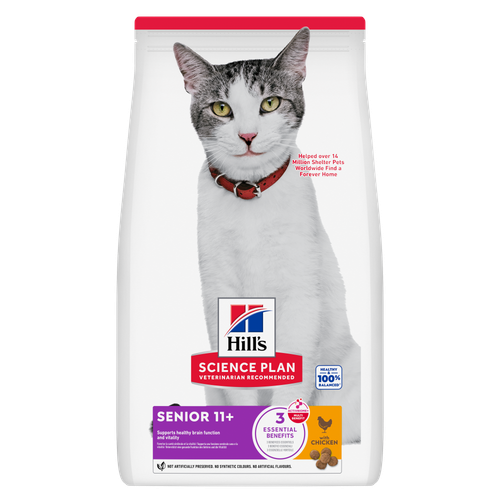
Hill's Science Plan Senior Cat Food with Chicken is a complete pet food, specially formulated with ActivBiome+ Multi-Benefit Technology.
This food supports healthy aging during the golden years. Contains a special ingredient blend to help keep older cats agile, more alert & interactive.

Hill's Science Plan Urinary Health Adult Cat Food with Chicken supports the health of the whole urinary system. Suitable for sterilised cats.

Hill's Science Plan Sterilised Cat Mature Adult Cat Food with Chicken is specially formulated with ActivBiome+ Multi-Benefit Technology. It is a precisely balanced nutrition tailored to meet the needs of mature adult sterilised cats, ages 7+, and to promote graceful ageing.
Related articles
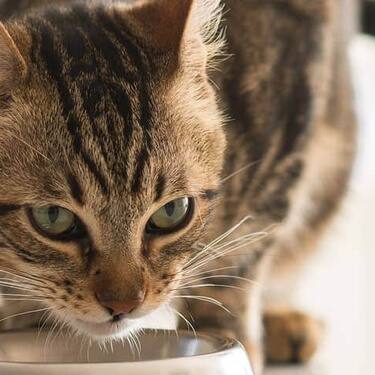
Discover what you can do to spot and support a sensitive cat stomach. See what routines and food you can implement to help your cat be happy and healthy.
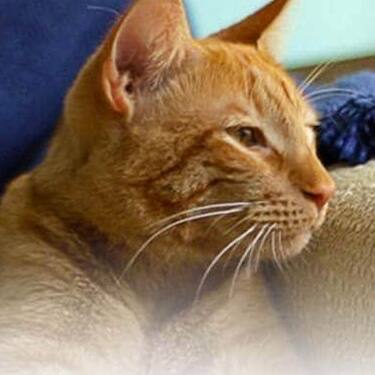
Find the right Hill
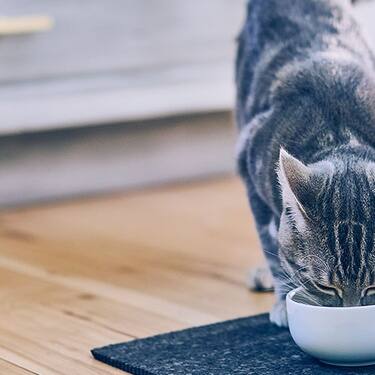
Good nutrition is about the right balance of nutrients. Learn more about health issues when feeding a cat food that has an improper nutritional balance from your friends at Hills Pet Nutrition.
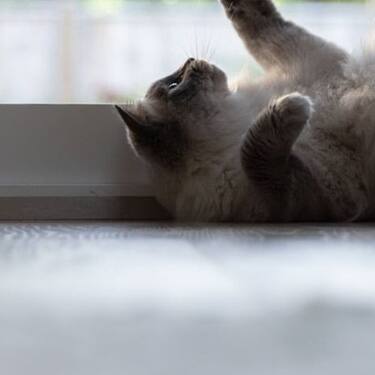
Feeding time can be a wonderful bonding opportunity for you and your cat. Find out how to make the most of it and create a healthy habit with HIll's Pet UK.

Put your cat on a diet without them knowing
Our low calorie formula helps you control your cat's weight. It's packed with high-quality protein for building lean muscles, and made with purposeful ingredients for a flavourful, nutritious meal. Clinically proven antioxidants, Vitamin C+E, help promote a healthy immune system.
Put your cat on a diet without them knowing
Our low calorie formula helps you control your cat's weight. It's packed with high-quality protein for building lean muscles, and made with purposeful ingredients for a flavourful, nutritious meal. Clinically proven antioxidants, Vitamin C+E, help promote a healthy immune system.

